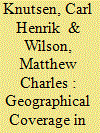|
|
|
Sort Order |
|
|
|
Items / Page
|
|
|
|
|
|
|
| Srl | Item |
| 1 |
ID:
152230


|
|
|
|
|
| Summary/Abstract |
Do elections reduce or increase the risk of autocratic regime breakdown? This article addresses this contested question by distinguishing between election events and the institution of elections. The authors propose that elections stabilize autocracies in the long term but at the price of short-term instability. Elections are conducive to regime survival in the long run because they improve capacities for co-optation and repression but produce short-term instability because they serve as focal points for regime opposition. Drawing on data from 259 autocracies from 1946 to 2008, the authors show that elections increase the short-term probability of regime failure. The estimated effect is retained when accounting for the endogeneity of autocratic elections; this finding is critical, since some autocrats may or may not hold elections because of perceived effects on regime survival. The authors also find that this destabilizing effect does not operate in the long term. They find some, although not as strong, evidence that elections stabilize autocratic regimes in the medium to long term, despite their destabilizing immediate effects. These temporal effect patterns are present for both executive and legislative elections, and they are robust to using different measures, control variable strategies, and estimation techniques. In line with expectations, both effect patterns are much clearer for multiparty autocratic elections than for completely uncontested elections.
|
|
|
|
|
|
|
|
|
|
|
|
|
|
|
|
| 2 |
ID:
186675


|
|
|
|
|
| Summary/Abstract |
We describe and analyze patterns in the geographical focus of political science research across more than a century. Using a new database of titles and abstracts from 27,690 publications in eight major political science journals from their inception, we demonstrate that, historically, political scientists concentrated their studies on a limited number of countries situated in North America and Western Europe. While a strong focus on Western countries remains today, we detail how this picture has changed somewhat over recent decades, with political science research becoming increasingly “globalized.” Still, several countries have received almost no attention, and geographical citation patterns differ by subfield. For example, we find indications of a greater focus on the United States and large Western European countries in international relations than in comparative politics publications. We also analyze several correlates of a country being the focus of political science research, including the country’s predominant languages, income, population size, democracy level, and conflict experience, and show systematic variation in the geographical focus of research. This unequal focus, we argue, has important implications regarding the applicability of extant descriptive and causal claims, as well as the development of theories in political science.
|
|
|
|
|
|
|
|
|
|
|
|
|
|
|
|
| 3 |
ID:
166004


|
|
|
|
|
| Summary/Abstract |
The Historical Varieties of Democracy dataset (Historical V-Dem) contains about 260 indicators, both factual and evaluative, describing various aspects of political regimes and state institutions. The dataset covers 91 polities globally – including most large, sovereign states, as well as some semi-sovereign entities and large colonies – from 1789 to 1920 for many cases. The majority of the indicators come from the Varieties of Democracy dataset, which covers 1900 to the present – together these two datasets cover the bulk of ‘modern history’. Historical V-Dem also includes several new indicators, covering features that are pertinent for 19th-century polities. We describe the data, coding process, and different strategies employed in Historical V-Dem to cope with issues of reliability and validity and ensure intertemporal and cross-country comparability. To illustrate the potential uses of the dataset we describe patterns of democratization in the ‘long 19th century’. Finally, we investigate how interstate war relates to subsequent democratization.
|
|
|
|
|
|
|
|
|
|
|
|
|
|
|
|
|
|
|
|
|